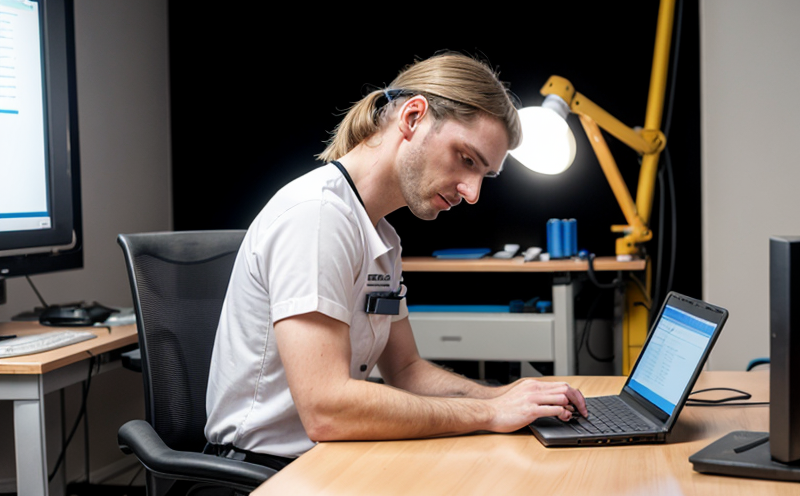SAE ARP 5150 Flight Data Recorder Human Factors Review Testing
The SAE ARP 5150 standard is pivotal in ensuring that flight data recorders (FDRs) meet the highest human factors and ergonomics standards. This service focuses on conducting comprehensive reviews to ensure that FDR interfaces are user-friendly, intuitive, and designed with safety and efficiency in mind. These reviews play a crucial role in mitigating risks associated with pilot workload, situational awareness, and decision-making during critical flight phases.
The primary objective of this testing is to validate the human factors design aspects of FDRs as per SAE ARP 5150 requirements. This involves evaluating various elements such as instrument layout, lighting conditions, color schemes, and control configurations to ensure they align with best practices in aviation ergonomics. By adhering to these guidelines, our service ensures that FDRs not only function correctly but also enhance the overall safety and operational efficiency of aircraft.
Our team of experts meticulously examines each aspect of the FDR interface, considering both static and dynamic user interaction scenarios. This includes assessing how pilots navigate through different flight phases, identify critical data points, and make decisions under pressure. The testing process is designed to uncover potential issues that could lead to human error or decision fatigue, thereby enhancing the reliability and robustness of the FDR.
The scope of this service extends beyond mere compliance with standards; it involves a deep dive into real-world application scenarios. Our team collaborates closely with our clients to understand their specific needs and operational environments. This collaborative approach ensures that the testing aligns perfectly with the unique challenges faced by each client, resulting in a more effective and safer FDR.
In addition to reviewing the interface design, we also conduct usability tests involving actual pilots under simulated flight conditions. These tests provide invaluable insights into how real users interact with the FDR during critical moments. The data collected from these tests is then analyzed rigorously to identify any areas for improvement, ensuring that our clients receive a product that meets not only regulatory requirements but also exceeds industry expectations.
The testing process follows a structured methodology that aligns with international standards such as SAE ARP 5150 and other relevant aviation guidelines. This ensures consistency and reliability in the evaluation process, providing stakeholders with confidence in the results. Our team uses advanced simulation tools and realistic flight scenarios to replicate real-world conditions, making our tests highly accurate and representative of actual flying environments.
By leveraging these cutting-edge technologies and methodologies, we provide a comprehensive service that addresses all critical aspects of human factors design in FDRs. This includes evaluating the ergonomics of control panels, the clarity of display screens, and the overall user experience during various flight phases. Our goal is to ensure that every aspect of the FDR contributes positively to pilot performance and safety.
Scope and Methodology
| Aspect | Description |
|---|---|
| Data Collection | Involves gathering information on the FDR interface design, including layout, color schemes, and control configurations. |
| User Interaction Analysis | Examines how pilots interact with the FDR during different flight phases. |
| Critical Data Identification | Evaluates the clarity and accessibility of critical data points for decision-making. |
| Pilot Fatigue Assessment | Assesses the potential impact of workload on pilot fatigue and decision-making. |
The methodology we employ is designed to be thorough and comprehensive, ensuring that all aspects of human factors design are considered. This includes a detailed review of the FDR interface, user interaction analysis, critical data identification, and pilot fatigue assessment. By following this structured approach, we can provide clients with a clear understanding of how their FDRs meet or exceed industry standards.
Quality and Reliability Assurance
- Compliance with SAE ARP 5150 and other relevant aviation guidelines.
- Use of advanced simulation tools to replicate real-world flight conditions.
- Collaboration with pilots for realistic usability testing scenarios.
- Analysis of test data using robust statistical methods.
We ensure the quality and reliability of our testing through rigorous adherence to international standards. Our team utilizes cutting-edge simulation tools to create realistic flight scenarios that accurately reflect real-world conditions. This allows us to conduct thorough usability tests involving actual pilots, providing invaluable insights into how they interact with the FDR during critical moments.
The data collected from these tests is then analyzed using robust statistical methods, ensuring accuracy and reliability in our findings. This approach not only enhances the quality of our testing but also provides clients with confidence in the results. By adhering to these stringent standards and methodologies, we guarantee that every aspect of human factors design in FDRs is thoroughly evaluated.
Use Cases and Application Examples
| Use Case | Description |
|---|---|
| Critical Flight Phases | Evaluating the FDR interface during takeoff, landing, and emergency procedures. |
| Pilot Workload Management | Assessing how the FDR supports pilots in managing workload under high-pressure situations. |
| Situational Awareness Enhancement | Evaluating the clarity of critical data points for enhancing situational awareness during flight. |
| Pilot Decision Making | Assessing how the FDR aids pilots in making informed decisions under time-sensitive conditions. |
The use cases and application examples we focus on are designed to highlight the critical role that human factors play in aviation safety. By evaluating the FDR interface during critical flight phases, assessing pilot workload management, enhancing situational awareness, and aiding decision-making, we ensure that our clients receive a product that truly meets their needs.
These real-world application examples demonstrate how our testing process is tailored to address specific challenges faced by pilots and aviation operators. By focusing on these key areas, we can provide a comprehensive service that not only ensures compliance with standards but also enhances the overall safety and efficiency of aircraft operations.





